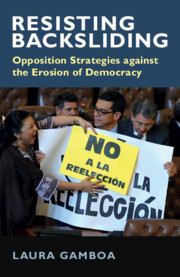Book contents
- Resisting Backsliding
- Resisting Backsliding
- Copyright page
- Dedication
- Contents
- Figures
- Tables
- Acknowledgments
- 1 Introduction
- 2 Opposition Strategies against the Erosion of Democracy
- 3 Electing Leaders with Hegemonic Aspirations
- 4 “Chávez Vete Ya”: The Erosion of Democracy in Venezuela
- 5 Preventing the Erosion of Democracy in Colombia
- 6 Opposition Strategies Elsewhere
- 7 Conclusion
- Book part
- References
- Index
4 - “Chávez Vete Ya”: The Erosion of Democracy in Venezuela
Published online by Cambridge University Press: 10 November 2022
- Resisting Backsliding
- Resisting Backsliding
- Copyright page
- Dedication
- Contents
- Figures
- Tables
- Acknowledgments
- 1 Introduction
- 2 Opposition Strategies against the Erosion of Democracy
- 3 Electing Leaders with Hegemonic Aspirations
- 4 “Chávez Vete Ya”: The Erosion of Democracy in Venezuela
- 5 Preventing the Erosion of Democracy in Colombia
- 6 Opposition Strategies Elsewhere
- 7 Conclusion
- Book part
- References
- Index
Summary
Up until the 1990s, Venezuela was one of the longest-running and most stable uninterrupted liberal democracies in Latin America. Today, it is an authoritarian regime. In nineteen years, Hugo Chávez and his successor, Nicolás Maduro, managed to destroy the system of checks and balances, end free and fair elections, and terminate political rights and civil liberties. The government has delayed and canceled elections, circumvented the authority of the elected legislature, imprisoned political opponents without trial, used lethal force against protesters, and banned opposition parties. How is it that Venezuela, historically one of the most robust democracies in the region, turned into the second most authoritarian country in Latin America?
Keywords
- Type
- Chapter
- Information
- Resisting BackslidingOpposition Strategies against the Erosion of Democracy, pp. 98 - 128Publisher: Cambridge University PressPrint publication year: 2022

